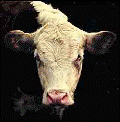Animal Science, Department of

Department of Animal Science: Dissertations, Theses, and Student Research
Date of this Version
5-2014
Document Type
Thesis
Citation
Hasenauer, T.L., Effects of distillers grains plus solubles and monensin supplementation on yearlings grazing smooth bromegrass. 2014. Univ. Neb. MS Thesis.
Abstract
Supplementing cattle on grass is an effective way of increasing animal efficiency and grass utilization. Distiller grains plus solubles (DGS) supplementation has been repeatedly proven as an effective supplement by providing ruminally undegradable protein (RUP), fat, and highly digestible fiber. The effects of monensin supplementation on grazing cattle are variable. Although some research has shown a decrease in forage organic matter intake (FOMI), the popular belief is monensin increases ADG while maintaining DMI in a grazing situation. Two experiments were designed to observe the effects of DGS and monensin supplementation on cattle grazing smooth bromegrass. In the first study, ADG and modified distillers grains plus solubles (MDGS) intake were measured for cattle grazing smooth bromegrass. Steers were supplemented MDGS at 0.05, 0.4, 0.6, or 0.8% BW and were either given 0 or 200 mg monensin. In the second study, FOMI was estimated when cattle grazing smooth bromegrass were supplemented with MDGS at 0.4% BW was given 0 or 200 mg monensin. In the first study, monensin did not affect ADG (P = 0.53). There was a monensin x MDGS intake interaction (P = 0.05). Monensin decreased MDGS consumption only when supplement was offered at 0.8% BW (P = 0.01). In the second study, monensin tended to decrease FOMI by 9% (P = 0.10).
Advisor: Terry J. Klopfenstein


Comments
A THESIS Presented to the Faculty of The Graduate College at the University of Nebraska In Partial Fulfillment of Requirements For the Degree of Master of Science, Major: Animal Science, Under the Supervision of Professor Terry J. Klopfenstein. Lincoln, Nebraska: May 2014
Copyright (c) 2014 TYLER HASENAUER